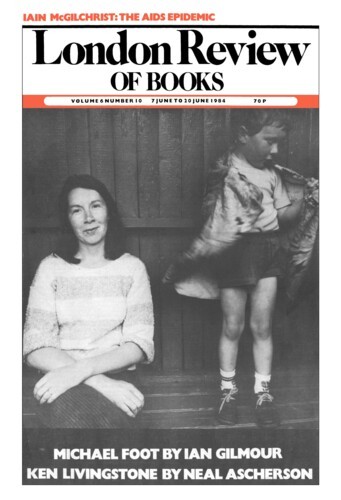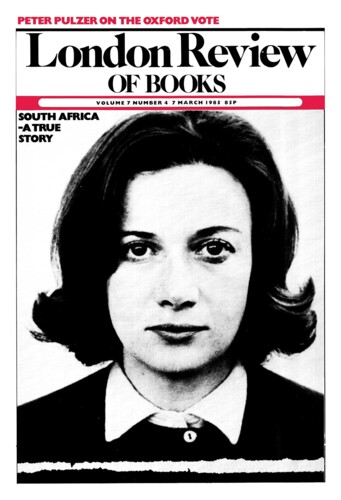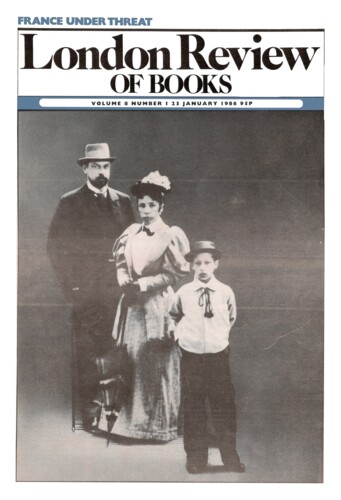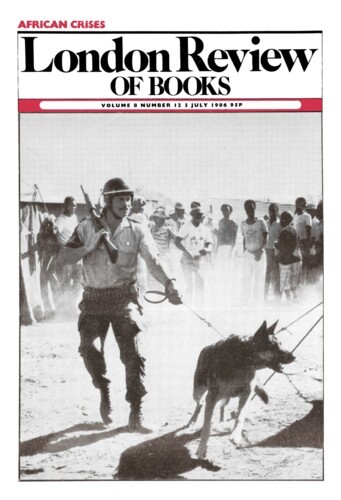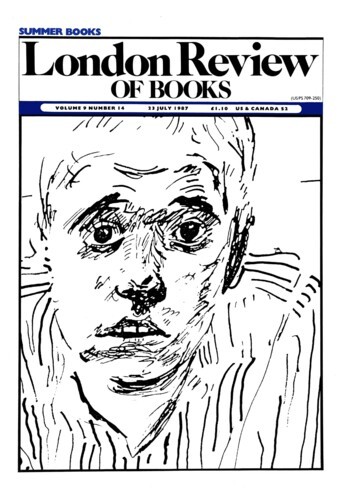Blair Worden
Blair Worden’s many books include God’s Instruments: Political Conduct in the England of Oliver Cromwell.
Insolence
Blair Worden, 7 March 1985
In 1892 A.C. Benson published an essay which introduced the modern appreciation of Andrew Marvell. For more than two hundred years Marvell’s verse had shared with Metaphysical poetry a lowness of esteem which now seems puzzling. As the Cyclopaedia of English Literature explained in 1844, Marvel ‘is better known as a prose writer than a poet, and is still more celebrated as a patriotic member of parliament’. Benson rejected those priorities. He saw Marvell’s political involvement as a cause not for pride but for shame. ‘Few poets,’ he warned, ‘are of sufficiently rough and impenetrable fibre as to be able with impunity to mix with public affairs,’ for the ‘stream’ of ‘their inspiration’ is ‘apt to become sullied at the very source by the envious contact of the world’. To Marvell’s career as a Cromwellian civil servant and Whig pamphleteer ‘we owe the loss of a great English poet’. A reading of Marvell’s ‘peculiarly distasteful’ tract The Rehearsal Transpros’d brought home a grim lesson: ‘the singer of an April mood, who might have bloomed year after year in young and ardent hearts, is buried in the dust of politics, in the valley of dead bones.’
Calvinisms
Blair Worden, 23 January 1986
1985 saw the tercentenary of the Revocation of the Edict of Nantes, the event which banished Protestantism from France after nearly a century of precarious legal protection. The anniversary, capably bruited by the Huguenot Society, was also seized upon for an enterprising non-denominational purpose. By extracting from a distinguished team, drawn from both sides of the Channel, the essays assembled in International Calvinism 1541-1715, Menna Prestwich has brought the findings of recent European scholarship – some of them reported at first, others at second hand – to an English audience hitherto under-acquainted with them. That was a clever move, for most of the book has little to do with 1685, a date by which the decisive contribution of Calvinism to the political and intellectual history of Europe (and, if it made one, to its social history) was past. The centre of the book’s gravity is the later 16th and earlier 17th centuries. Deciding that ‘it would not have been sensible or tactful to issue detailed directives’ to leading scholars in the field, Prestwich gives them a loose rein. The result is a collection of essays which are without exception helpful but which vary disconcertingly in scope, in time-span and in polish. Some are patiently introductory, others densely sophisticated. The editor’s introduction, although efficiently panoramic, scarcely draws together such threads as the book possesses.’
Friend to Sir Philip Sidney
Blair Worden, 3 July 1986
Four hundred years ago, on 17 October 1586, Sir Philip Sidney died at the age of 31 of a wound sustained in a skirmish at Zutphen, where his forces had fought for the Dutch cause against Spanish domination of the Netherlands. It was one of the great deaths of English history. His early biographers – or hagiographers – wrought a tale of battlefield heroism and deathbed stoicism that helped the myth of Sidney to become more powerful than the man had ever been. The funeral procession in London, arranged at the crippling expense of his father-in-law Sir Francis Walsingham, Secretary of State to Queen Elizabeth, and preserved in the public imagination by Thomas Lant’s pictorial roll, was the grandest accorded to an English subject before Nelson: a determined show of strength by the forward Protestant party to which Sidney had belonged and in whose cause he became a martyr. Poets wrote elegies which answered to a widespread sense of waste and desolation. They were to be echoed a quarter of a century later upon a no less memorable early death, that of Henry Prince of Wales, the heir not only to the throne but to Sidney’s role of lost Protestant leader.’
Strange Talk at Putney
Blair Worden, 23 July 1987
In the archives of Worcester College, Oxford there lies one of the most remarkable and affecting documentary legacies of the English past. The papers of William Clarke, a secretary in the Cromwellian Army, contain his transcript of the meetings at Army headquarters in late October and early November 1647 which posterity knows as the Putney Debates. The officers, soldiers and Levellers who debated the Parliamentary franchise and the post-war settlement of the kingdom bequeathed an unrivalled glimpse of 17th-century political articulacy below the level of political privilege. It was at Putney that Thomas Rainborough spoke for ‘the poorest he that lives in England’, and that he heard, in the pleas of Cromwell’s son-in-law Henry Ireton for the rights of property, ‘nothing at all that can convince me, why any man that is born in England ought not to have his voice in election of burgesses.’ It was there that Ireton quarrelled with the Levellers, in terms close to those of Hobbes’s Leviathan four years later, about the obligation of men to perform their political covenants. And it was there that the Levellers John Wildman and Maximilian Petty mounted the fundamental challenge to the constitution that would be rewarded by the abolition of monarchy and the House of Lords two years later. Even the sophisticated qualifications of modern scholarship, which have dwelled on the distance that separates the language and presuppositions of the soldiers from our own, have not dimmed the wonder both of the survival and of the content of Clarke’s record.
Pieces about Blair Worden in the LRB
Past v. Present: Blair Worden’s Civil War
Phil Withington, 10 May 2012
Societies, it is sometimes said, get the politics they deserve. Can the same be said for their history? If contemporary Britain is anything to go by then the short answer is probably yes....
Mighty Causes: the English Civil Wars
Mark Kishlansky, 11 June 2009
Thomas Hardy, it is said, believed the history of humanity could be written in six words: ‘They lived, they suffered, they died.’ As a historical account this was more than adequate....
New Model Criticism: Writing Under Cromwell
Colin Burrow, 19 June 2008
‘Politics’ is a strange word, and the particular nature of its strangeness may explain why so many people feel confused by or alienated from political processes. It can refer...
Sagest of Usurpers: Cromwell since Cromwell
Ian Gilmour, 21 March 2002
Shortly after Oliver Cromwell’s death in September 1658, Dryden wrote some ‘Heroique Stanza’s, Consecrated to the Glorious Memory of his most Serene and Renowned Highnesse...
Austere and Manly Attributes
Patrick Collinson, 3 April 1997
Unlike 1588, the Armada Year, 1578 has not endured in the national memory. But to those alive at the time, and especially those in charge of affairs – committed, ‘forward’...
Types of Ambiguity
Conrad Russell, 22 January 1987
The Church shall not so expound one place of Scripture that it shall be repugnant to another. Of all the Thirty-Nine Articles, this is perhaps the most difficult, yet it lays down a scholarly...
Tribute to Trevor-Roper
A.J.P. Taylor, 5 November 1981
The festschrift, a collection of essays in honour of a senior professor, used to be dismissed as a rather tiresome German habit. Now, I think, it has become embedded in English academic...
Read anywhere with the London Review of Books app, available now from the App Store for Apple devices, Google Play for Android devices and Amazon for your Kindle Fire.
Sign up to our newsletter
For highlights from the latest issue, our archive and the blog, as well as news, events and exclusive promotions.
